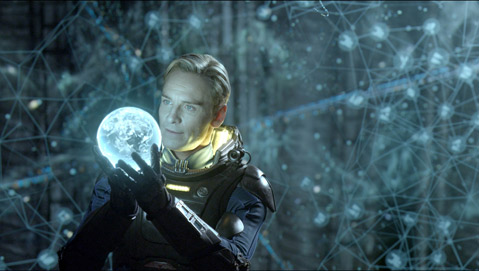Prometheus
Noomi Rapace, Michael Fassbender, and Guy Pearce star in a film written by John Spaits and Damon Lindelof and directed by Ridley Scott.

When it comes to sci-fi films about singularly unpleasant, non-ET-style alien life forces, the genre-mining mind tends to go back to at least two prominent examples: Mars Attacks and Alien, with their body-snatching and -abusing creatures without mercy or interest in Earth-style negotiation. Before there was Alien, by prequel logic, there was/is Prometheus, Ridley Scott’s much bigger-budgeted, visually stunning variation on the sequel-ized theme of his 1979 low-ish budget/high-impact classic.
As in Alien, the ETs here are famous for getting under your skin in the most unpleasant and invasive way. They have none of the cartoony charm of the Mars Attack-ers (although there are some goopy things that go boom in helmets). It all begins innocently enough, armed with high hopes, scientific idealism, and lined with philosophical questions about life and the universal design. In the late 21st century, the spaceship Prometheus has traveled to the distant moon LV-233, steered there by cave paintings of ancient “engineers” leading the way to what they assume is the source of life. But other fates lie ahead, and the sense of awaiting un-pleasantries begins as the lunar vehicles proceed toward the hulking structure where the mysterious life forces lurk.
Casting is well in place for chilling summer blockbuster fare. Noomi Rapace, continuing the brute, cunning physicality of her Girl with the Dragon Tattoo turn, is ideal as an archeologist turned kick-ass warrior and brave self-arranged surgery subject. Charlize Theron’s icy cool demeanor translates well, and Michael Fassbender impresses as a robot not about to lose his head over much of anything, if he can help it.
Scott’s new film proceeds grippingly but grittily, with little in the way of self-effacing humor or winking awareness. Yet there are late-breaking moments of hilarity and canny self-consciousness, having to do with a talking head and a gratuitous final scene paying homage to Alien’s famous beast bursting out of a very upset stomach. In its way, the scene seems like Scott’s homage to the famous, unrelated ending shot in the 1903 film The Great Train Robbery, a shocker in which a gunman flashes a menacing look and shoots directly at the camera. Why? Because the filmmaker could, and understood the power of a vivid cinematic image in our faces. Or, in Scott’s case, the power to stir that gurgling feeling in our bellies.



